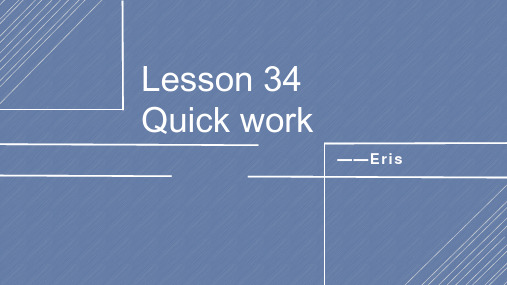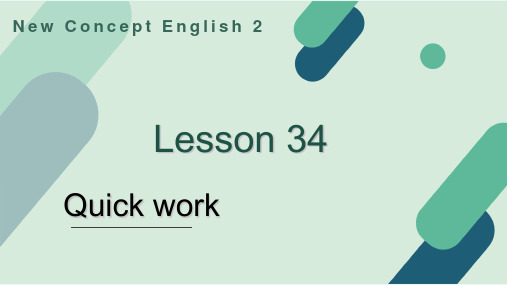新概念第二册34课PPT课件
合集下载
(完整版)新概念英语第二册课件(Lesson-34-Quick-work)

★ most [ məust ] ad. 最;相当,非常 e.g. the most important discoveries a most interesting movie
worry ['wʌri] ['wɜ:ri] adj.表示“焦虑的”、“担心的” e.g.: She’s worry. vt. 表示“使担心/发愁” e.g.: Nothing worries me vi.表示“忧虑,担心” e.g.: She appears to be worried about
wonder= want to know wonder whether/if/who/when/where/what/why
+ 从句”
她想知道那个孩子在干吗。 She wondered what the child was doing. 我想知道他来不来。 I wonder whether/if he will come.
一只睡着的狗 a sleeping dog
一张焦虑的脸 a worried face
• Five days ago, the policeman told him, the bicycle was picked up in a small village four hundred miles away.
accept &receive? 他已经接受了我们的邀请。
He has accepted our invitation. 我没有收到你的传真。
I didn’t receive your fax. accept: 强调主动地或自愿地接受,或者说,经过考虑后同意
接受。
receive: 着重仅仅接到或收到这一结论或事实,而不含采取主 动或积极行动的意思。
新概念第二册 Lesson 34课件

课文分析
【2】Last Tuesday he received a letter from the local police.
★local adj. 当地的,本地的
local news 当地新闻 local color 地方特色 local people 当地人
native ['neɪtɪv] n. 土著人 adj. 土生土长的
【练一练】 这是这个家庭最有趣的照片。 This is the most interesting photo of the family.
单词讲解
many和much的最高级 many--more--most much--more--most most绝大多数的(前面不加冠词)
例:大多数的男孩喜欢足球。 Most of the boys like football. 【练一练】:他们中的大多数都迟到了。 Most of them were late.
She wondered who that man was/ what had happened. 她想知道那个人是谁/到底发生了什么事。
She wondered what the child was doing. 她想知道那个孩子在干吗。
I wonder whether/if he will come. 我想知道他来不来。
For some reason, they called off the party.
【练一练】开始下雨了所以我们取消了比赛。
It began to rain so we called off the match.
【练一练】
1. I called _o_n__ you five times yesterday. Were you out?
新概念2精品课件Lesson34

课文精讲
There is always hope that…
老外比较偏爱
there be 结构。
课文精讲
1 there be 结构与情态动词连用。
也许有个… There may be better solution to the problem. 必须得… There must be a person to cook the dinner. 毫无疑问 There can be no doubt about it.
有个离家很近的公车站是个很大的优势 There being a bus stop near to the house is a great advantage.
课文精讲
We were annoyed at there being so much time wasted.
让人吃惊的是竟然没有任何反对意见 It would be surprising for there not to be any objections
Vocabulary
Fascination 魅力,迷惑力 中国艺术对她有很大的吸引力 Chinese art has a great fascination for foreigners. 。
结合26 exert an influence on…? Chinese art exerts great fascination on foreigners. 结合9:Cats never fail to fascinate human beings. Chinese art never fails to fascinate foreigners. 结合29:certain funny situations have a universal appeal. Chinese art holds a peculiar appeal for foreigners.
新概念英语第二册 Lesson34(课堂PPT)

smiling unsmiling 一只睡着的狗 a sleeping dog 一张焦虑的脸 a worried face
13
Five days ago, the policeman told him, the bicycle was picked up in a small village four hundred miles
accept: 强调主动地或自愿地接受,或者说,经过考虑后 同意接受。
receive: 着重仅仅接到或收到这一结论或事实,而不含采 取主动或积极行动的意思。
a local newspaper local time local colour
a local pain 局部疼痛
9
In the letter he was asked to call at the station.
I have the most money in my class.
Most of the students like computer games.
most very
most带有主观感情 very是客观描述
First listen and then answer the questions: 1 . How long had the police taken to find his bicycle? 2.When did Dan Robinson receive the letter? 3. Did Dan Robinson go to the station? 4.Where was the bicycle picked up? 5.When was the bicycle stolen?
Last Tuesday he received a letter from the local police.
13
Five days ago, the policeman told him, the bicycle was picked up in a small village four hundred miles
accept: 强调主动地或自愿地接受,或者说,经过考虑后 同意接受。
receive: 着重仅仅接到或收到这一结论或事实,而不含采 取主动或积极行动的意思。
a local newspaper local time local colour
a local pain 局部疼痛
9
In the letter he was asked to call at the station.
I have the most money in my class.
Most of the students like computer games.
most very
most带有主观感情 very是客观描述
First listen and then answer the questions: 1 . How long had the police taken to find his bicycle? 2.When did Dan Robinson receive the letter? 3. Did Dan Robinson go to the station? 4.Where was the bicycle picked up? 5.When was the bicycle stolen?
Last Tuesday he received a letter from the local police.
新概念英语第二册Lesson34课件

• most • 1) adv.相当,非常 (用于加强语气;修饰adj.前面可加不定冠词) 例: Dan was most surprise when he-heard the news. 当Dan听到这个消息时非常吃惊。 This is a most useful book. 这是一本非常有用的书。 He was most polite to me. 他对我非常礼貌。
• I called _o_n__ you five times yesterday. Were you out? • If you need any help, please call me at 11234. • We called o__u_t_ to him but he could not hear us.
• The thief was brought to the nearby police station. • 小偷被带到附近的派出所。 • 2) n.车站 • A railway station 火车站 • A bus station 汽车站 • She got off at Victoria Station. • 她在维多利亚车站下了车。
• Song Ci (宋慈), in Song Dynasty
• Considered as the first professional medical examiner (法医) in the world.
• Comprehended the unique skill of dissecting (解剖) dead bodies that helped him solve some most difficult cases.
• 4) many和much的最高级many--more--most much--more--most • 5) most绝大多数的(前面不加冠词) • 例: Most of the boys like football. 大多数的男孩喜欢足球。 • Most of them were late. 他们中的大多数都迟到了。
新概念英语第2册课件Lesson34(共32页)

most英音:[məust] 形容词 a. 1.(many, much的最高级)最多的;最高程度的
Which of you has made the most mistakes? 你们当中谁错得最多? 2.多数的;大部分的
Most birds can fly. 多数的鸟会飞。 代词 pron. 1.最大量,最多数,最高额[the S]
Well begun is half done.
好的开始是成功的一半
Out of the darkness
1.Where did the girl set out from one afternoon? 2. Was she in a small boat or a large one? 3. She was caught in a storm, wasn’t she? 4. Where did her boat strike? 5. What time of day was it? 6. Which way did she swim? 7. How long did she spend in the water? 8. How far did she swim? 9. When did she see a light ahead of her? 10. How did she know she was near the shore? 11. Where did she climb up? 12. Where was she trying to get to? 13. Where did she find herself when she woke u
1.How long had the police taken to find his bicycle?
新概念英语第二册Lesson34课课件(共46张PPT)

I didn’t receive your fax.
• the local police 当地警察局 • 1)地方的,本地的,地区的(尤作定语) • belonging to a particular place or
district • 属于某个特殊的地方或区域 • local news 当地新闻 • a local station 地方的一个车站 • local farmers 当地的农民
常好。
• very:客观的陈述 • 例:He is very tall. 他非常高。
• 2) adv.最(修饰动词,但不放在动词和 它的宾语之间)
• 例:What' s troubling you most?什么 事情令你最麻烦?
• What most pleased me was that. . . . .
• local government 当地政府 • local time 当地时间 • local color 地方特色 • 2)(身体)局部性的 • a local pain 局部疼痛 • 3) a local line 支线 • a local train 普通列车
• …… has been worried all week.
• 当Dan听到这个消息时非常吃惊。
• This is a most useful book. 这是一 本非常有用的书。
• He was most polite to me. 他对我非 常礼貌。
• most与very区别: • most:表示观的感情, 见解 • 例:He was most kind to me.他对我非
Think about how the writer organizes the story and try to retell it.
• the local police 当地警察局 • 1)地方的,本地的,地区的(尤作定语) • belonging to a particular place or
district • 属于某个特殊的地方或区域 • local news 当地新闻 • a local station 地方的一个车站 • local farmers 当地的农民
常好。
• very:客观的陈述 • 例:He is very tall. 他非常高。
• 2) adv.最(修饰动词,但不放在动词和 它的宾语之间)
• 例:What' s troubling you most?什么 事情令你最麻烦?
• What most pleased me was that. . . . .
• local government 当地政府 • local time 当地时间 • local color 地方特色 • 2)(身体)局部性的 • a local pain 局部疼痛 • 3) a local line 支线 • a local train 普通列车
• …… has been worried all week.
• 当Dan听到这个消息时非常吃惊。
• This is a most useful book. 这是一 本非常有用的书。
• He was most polite to me. 他对我非 常礼貌。
• most与very区别: • most:表示观的感情, 见解 • 例:He was most kind to me.他对我非
Think about how the writer organizes the story and try to retell it.
新概念英语第2册课件Lesson34(共34页)

【课文讲解】
• 1、Quick work • quick adj. 动作的快; fast adv. 速度的快;
soon adv. 时间快 • have a quick meal • quick freeze 速冻 • 这篇题目取为quick work的涵义?
• 2、Ted Robinson has been worried all the week.
• wonder表示“想知道”时后面往往跟疑问 词引导的从句
• She wondered who that man was/what had happened.
• want用于被动语态时可以表示“想与(某 人见面、谈话等)”或“缉拿,追捕”
例子:This is the man (who is) wanted by the police.
adv. 相当,非常
• ① adj. 用于最高级,表示“最……”
This is the most beautiful car I’ve even seen.
• ② adj. 大多数的,大部分的
Most doctors don’t smoke.
• ③ adv. 非常,很(相当于very,但通常用于表达主观感情、 见解等)
• Ted Robinson has been worried all the week. Last Tuesday he received a letter from the local police. In the letter he was asked to call at the station. Ted wondered why he was wanted by the police, but he went to the station yesterday and now he is not worried any more. At the station, he was told by a smiling policeman that his bicycle had been found. Five days ago, the policeman told him, the bicycle was picked up in a small village four hundred miles away. It is now being sent to his home by train. Ted was most surprised when he heard the news. He was amused too, because he never expected the bicycle to be found. It was stolen twenty years ago when Ted was a boy of fifteen !
- 1、下载文档前请自行甄别文档内容的完整性,平台不提供额外的编辑、内容补充、找答案等附加服务。
- 2、"仅部分预览"的文档,不可在线预览部分如存在完整性等问题,可反馈申请退款(可完整预览的文档不适用该条件!)。
- 3、如文档侵犯您的权益,请联系客服反馈,我们会尽快为您处理(人工客服工作时间:9:00-18:30)。
她在维多利亚车站下了车。
2.(各种机构的)站,所,局,署[C]
The pickpocket was brought to the nearby
police station.
小偷被带到附近的派出所。
3.广播电台,电视台;电视频道[C]
I don't like the program. What's on the other
小偷被带到附近的派出所。
3.广播电台,电视台;电视频道[C]
I don't like the program. What's on the other
station?
我不喜欢这个节目。另外那个台在上演什么?
-
18
1.station英音:['steiʃən]
名词 n.
1.车站[C]
She got off at Victoria Station.
3. She was caught in a storm, wasn’t she?
4. Where did her boat strike?
5. What time of day was it?
6. Which way did she swim?
7. How long did she spend in the water?
5. cover a distance of + 具体距离
6. next / other 7. On arriving … = as soon as/ when she
arrived…主从句的主语必须一致 8. find sb./sth. + 宾语补足语
-
7
-
8
-
9
nearly, passed, explain, happen to, set out,
-
16
1.How long had the police taken to find his bicycle?
2. Was Dan worried or not when he received a letter from the police? Why?
3. What did Dan feel when he heard the news?
B: …
A: You are so brave. We’re proud of
you. May I ask you some questions?
-
10
B: …
have\has played with a cat
-
11
have\has skated in winter
-
12
have\has taken pictures
station?
我不
most英音:[məust]
形容词 a.
1.(many, much的最高级)最多的;最高程度的
Which of you has made the most mistakes?
你们当中谁错得最多?
2.多数的;大部分的
Most birds can fly.
Well begun is half done.
好的开始是成功的一半
1
Out of the darkness
-
2
-
3
-
4
-
5
1.Where did the girl set out from one afternoon?
2. Was she in a small boat or a large one?
-
17
1.station英音:['steiʃən]
名词 n.
1.车站[C]
She got off at Victoria Station.
她在维多利亚车站下了车。
2.(各种机构的)站,所,局,署[C]
The pickpocket was brought to the nearby
police station.
-
13
-
14
the bike.
-
15
1.His bicycle had been ______________. 2. Five days ago, his bicycle was
____________ in a small village _______. 3. The bicycle is now being ________ to his home ____________. 4. The bicycle was _________ twenty years ago when Dan ___________.
be caught in, struck, jumped into, swam to,
Spend, covered, saw, knew, near, cliffs,
arrive, struggle up, remember, woke up,
found, in hospital
A: Hello,… How are you feeling now?
13. Where did she find herself when she woke u
-
6
How?
1. passed / past
2. be able to / can / could
3. happen to
4. set out from / out of / be caught in / jump into 介词/副词总结
-
20
1.Dan Robinson has been worried all week. 丹·鲁宾逊焦 虑了整整一个星期。
worried 在这里可以当成是形容词, 表示"焦虑的"、"担心的"。worry 也可以作及物动词,表 示"使担心/发愁"等: She appears to be worried by/ about something.好像
8. How far did she swim?
9. When did she see a light ahead of her?
10. How did she know she was near the shore?
11. Where did she climb up?
12. Where was she trying to get to?
多数的鸟会飞。
代词 pron.
1.最大量,最多数,最高额[the S]
I did the most I could.
我已尽最大的努力去做了。
2.大部分,大多数[(+of)]
Of course most of them don't agree with his opinion.
当然,他们中大多数人都不同意
